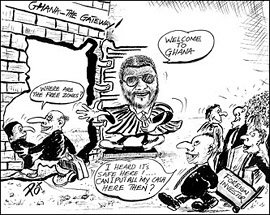 Free
Zones as an Incentive for Investors Free
Zones as an Incentive for Investors
One of the ways that Ghana is pursuing to establish itself firmly as an emerging market and a Gateway to West Africa is through the Gateway Project . Through it, Ghana hopes to boost exports as a pre-condition for achieving a sustainable high growth.
The Ghana Free Zones Board (GFZB) whose duty is to create an attractive and conducive environment, through the provision of competitive free zones incentives is implementing the Gateway Project. Mr. George Aboagye, the Executive Secretary of the Board said "we want Ghana to be a major transit center of goods and services to the sub-region".

A major component of this seven-year program is hinged on a Free Zones Project, which is aimed at attracting export-oriented companies and to serve as a catalyst to stimulate new private investment in the country. With a World Bank assistance, Ghana is spending a total of 56 million dollars, to provide basic infrastructure facilities such as roads, water and electricity to the established enclaves. The Free Zones Program is made up of three sectors. The Export Processing Zones (EPZ), Free Ports and Open Skies policies.
| Some measure of success has been recorded as the country moves from the establishment of the first enclave barely two years ago, to a second project in the Tema industrial area in the Greater Accra Region. The third enclave is being established at Takoradi, the second port city in Ghana’s Western Region.
There are activities in wide range of products and services including furniture, and wood products, metal fabrication, garments and protective clothing, petroleum products, food processing, rubber and plastic products, pharmaceuticals, commerce, warehousing, packaging, telecommunications and fiber glass manufacturing. The estimated export schedules of free zones is over 500 million dollars.
Thanks to the Ghana Investment Promotion Center’s (GIPC) efforts, Ghana has started to record capital inflow for the enclaves from the US, the Far East, especially Malaysia, Korea and Taiwan. "Between May and now we have received about 10 missions from the US. We are also getting interests from South Africa and Nigeria", said Mr. Kwesi Ahwoi Chief Executive of the GIPC.
One sector that has attracted so much investment is the energy sector. Investors are scrambling to invest in this sector because of the opportunity opened up last year by a severe energy shortage that forced the country to ration power consumption. This has led the government and the private sector to engage in finding other alternatives such as building of thermal plants for the country. The main producer of power previously is the government owned Volta River Authority (VRA) which has six 127MW turbines at Akosombo and a 160MW turbine on the Volta lake.
The effect of the energy crisis on neighboring countries has wised them up. Ghana, Togo, Benin and Nigeria have entered into an agreement with some public and private companies led by Chevron to build a West African Gas Pipeline (WAGP), that will supply gas from Nigeria Oilfields to countries in West Africa to support the growing regional energy demand along with new industrial development. |

